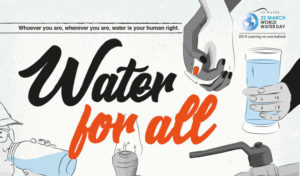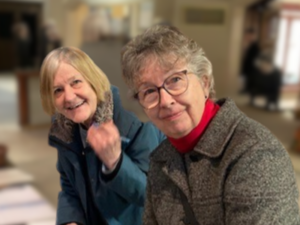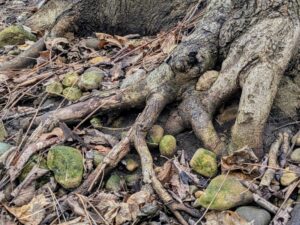Spirited Reflection: This World Water Day, leave no one behind

World Water Day March 22nd- helps inspire passion for sustainable management of this global resource, and promotes the UN Sustainable Development Goal #6:
Ensure access to clean water and sanitation for all.
Billions of people around the world (including in Canada) live without access to clean water. This year’s theme, “Leave no one behind”, reminds us that clean water is a human right, and that often those without access to clean water are marginalized in other ways as well, making access that much more difficult. People are left behind without clean water for many reasons including:
- Sex or gender
- Race, ethnicity, religion, birth, caste, language, and nationality
- Disability, age, and health
- Property, tenure, residence, economic and social status
To help ensure no one is left behind, we need to advocate for those who face water discrimination. To be truly sustainable, water policy and management needs to be inclusive and representative. In other words, access to clean water is a non-negotiable human right.
Reflect
First Nations communities in Canada are at a disproportionately high risk for lack of access to clean water. Off-reserve water management is the responsibility of provinces, but reserves are under the jurisdiction of the federal government. This means that First Nation communities on-reserve do not have tangible or enforceable regulations that ensure clean water. The Canadian government is attempting to eliminate all long-term drinking advisories (longer than 12 months) by March 2021, yet progress is mixed. While the number of long-term advisories has decreased overall, there are still new advisories being called. For example, and to name a few, the Mishkeegogamang Boil Water Advisory (BWA) was set on May 1, 2018, the Lake Manitoba BWA was set on April 20, 2018, and the Little Red River Cree Nation Garden River’s Do Not Consume advisory (DNC) was set June 20, 2018. For more, see map here.
Even when communities end their long-term water advisories, clean water is not guaranteed; 32 of the 79 long-term advisories that have been lifted have had another advisory placed back on the system. These stark numbers hint at the myth of universal access to water for all in Canada. Infrastructure, funding, adequate training, and, most importantly, willpower from politicians, are all lacking.
Give thanks
This World Water Day holds a special significance. A few weeks ago, Josephine Mandamin, a renowned water activist from Wikwemikong First Nation in Ontario, passed away at age 77. Mandamin co-founded the Mother Earth Water Walk in 2003 and walked more than 17,000 km around the Great Lakes to demonstrate her concern over pollution of rivers and lakes and to raise awareness of the need for education and advocacy.
Inspired by Josephine Mandamin, Doreen Day wrote the Water Song to give everyday thanks to water for sustaining our lives and the lives of all living things.
Ne-be Gee Zah-gay-e-goo (Water, we love you.)
Gee Ne-gwetch-wayn ne-me-goo (Water, we thank you.)
Gee Zah Wayn ne-me-goo (We respect you.)
To hear this song, click here.
On World Water Day 2019, please take a moment to reflect on the gift of water, and the hard work of those who have come before us and honouring their memories moving forward.
Amelia Berot-Burns (B.A, LL.M) is the Interim Ecological Justice Program Coordinator at KAIROS and has been a dedicated KAIROS volunteer in the past. She is particularly passionate about issues of ecological justice, specifically relating to resource extraction, water pollution, and climate change. With her background in international law, political science, and physical science, she is able to offer unique perspectives in her advocacy work.












